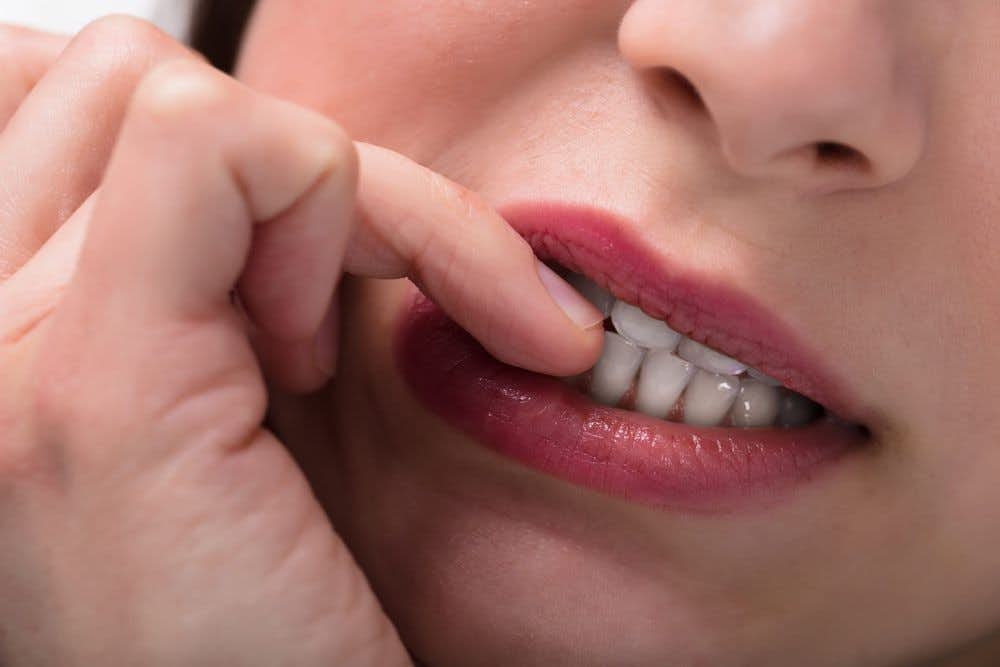August 27th, 2018

Do you bite your nails? If so, you’re not alone. It’s hard to know how many of us have actually developed and engage in this habit, mostly because there are variances among individual habits. Some people bite occasionally, others bite regularly, and others bite obsessively. However, Joseph Stromberg of Voz. Com states that “small-scale studies indicate about 20 percent or so of adults bite regularly - which would suggest millions of Americans do it”. When put in perspective, that’s a lot of us. So why are so many of us chewing away?
It turns out --- many of the reasons that we are biting away at our nails are due to a variety of mental health issues we are coping with. Nail-biting is merely a way that we are distracting ourselves from some of the daily difficulties we are dealing with. We can distract ourselves from these daily difficulties by turning our attention to developing unhealthy habits.

Stress/Anxiety Worry and fear are not only common, but a natural part of experiencing human emotions, thoughts, and feelings. When we are constantly concerned or distracted by our thoughts regarding issues going on in our lives, we find ways to cope. Biting nails is one of the habits that people can develop as a way to find calmness amongst the chaos they feel they are surrounded by. Depression According to the Depression and Bipolar Support Alliance, “major depressive disorder affects approximately 14.8 million American adults, or about 6.7 percent of the U.S. population age 18 and older, in a given year”. This staggering statistic can lead to some explanations as to why those who are suffering from depressing thoughts and emotions find the need to self-soothe, for some they find this nail-biting. Boredom As it may not categorize as a mental health concern, boredom is something that all humans face at some point in their lives, often daily. When we are lacking creativity or drive, we find ourselves lost. This sense of self-loss, or boredom, forces us to find things to do -- to stay active and alert. Enter, nail-biting. Obsessive-Compulsive Disorder Obsessive-Compulsive Disorder is a condition when a person experiences constant thoughts (obsessions) and behaviors (compulsions) that are repeated over and over. According to beyondocd.org, “in the United States, about 1 in 40 adults and 1 in 100 children have OCD”. For those suffering from this disorder, nail-biting could perhaps be one of those repeated behaviors, but it could also be the result of stress-related to other compulsions. Perfectionism Recent studies show that nail-biting could be the result of those who are seeking perfectionism in their lives. One of these studies, which was published in the Journal of Behavior Therapy and Experimental Psychiatry and led by Dr. Kieron O’Connor, found that people who tend to strive for perfection put excess amounts of pressure on themselves to not only work hard but to over excel and exceed the expectations of others. Being a perfectionist can lead to:
Nail-biting is one way that perfectionists tend to cope. As noted in this study, Dr. O’Connor states that as far as treatment, “we look at all the thoughts and behaviors present in situations at high risk for the habit and change them through cognitive therapy to more resemble the thoughts and behaviors in low-risk situations”.

It is clear how universal nail-biting is as a coping behavior. As a result, some people may experience further thoughts and emotions as a reaction to their nail-biting habit. Some of these may include:
It is evident that nail-biting can be either and/or both the cause and the result of mental health concerns. Hence, it is important that we develop healthier habits as a means to deal with these issues. Here are some ways you can begin the process of quitting...
Figure out what is the reason you bite your nails, this may be easy or hard to identify. Whether it's anxiety or boredom, being able to identify where the habit is developing from is always the first step to quitting.
Go out and get yourself a manicure. If you are not used to spending the time or money on this luxury, that’s OK, as a matter of fact, that’s great. By giving your nails some loving attention you may start to notice the beauty in your hands and not want to disrupt that by biting your nails.
Reaching out to friends and family is an effective way of creating a circle of support for yourself. Being surrounded by others who can hold you accountable is prime in breaking a habit. If you do not have anyone close who can support you, reach out to a professional.
There are plenty of other habits that you can develop in place of nail-biting. Identifying what works for you might take some time and be a game of trial and error. Some alternative ideas might include conscious breathing, meditation, yoga, or even something as fun as doodling.
Be kind to yourself. Acknowledge that what you are doing is hard. Whether you are a long-time or recent nail-biter, breaking a habit is not always easy. If you fall back, that’s alright. Give yourself some credit and acknowledge the progress you are making.
Easier said than done, right? This step can be the hardest, as it is for most habits trying to be broken. Remind yourself of your hard work every day, even multiple times a day. Stick to your plan to quit and know that you can do this!
Our Services
PHP and IOPAdult PsychiatryChild & Adolescent PsychiatryAdult TherapyChild & Adolescent TherapyCouples CounselingFamily TherapyGroup TherapyPsychological TestingTranscranial Magnetic Stimulation (TMS)